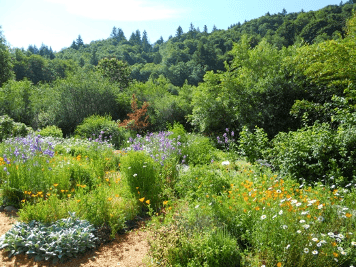In this series of blogs, Andrea Cardillo explores gardens as a metaphor for learning ecosystems. In last week’s blog, he discussed the Italian and French styles of garden as a metaphor for L&D within Orange organisations. This week he focuses on the English style of garden.
In my previous blog I focused on the Italian and French styles of garden as a metaphor for the L&D departments often seen within Orange organisations – to stick with Laloux’s definitions. However, I came to the conclusion that these tend not to be sustainable as a learning ecosystem. Why? Partly due to their resource hungry nature, and also the fact that they tend to be very much vision-centred rather than learner-centred. In this blog I focus on an English garden – will this prove to be more sustainable?
The English garden
If in Italian and French gardens nature was ‘tamed’ to ensure rationality and coherence of experience, in the romantic garden, the so-called English garden, natural landscape, wilderness and picturesque views play a key role. If you have ever walked among the pathways of Stourhead Landscape Garden in Wiltshire, or of the Englischer Garten in Munich, or of the English Gardens in the Royal Palace of Caserta, you will find no straight lines, but rather curves, hills and valleys, flowers and plants from exotic parts of the world.
The landscape is often peppered with fake Roman statues or ruins that invite the viewer to contemplate how time and nature in the long run reclaim their power over human plans and endeavours. It is not human reason, here, that is celebrated; on the contrary, the romantic garden invites us to engage with our intimate feelings, to connect with our ultimate powerlessness when faced with the power of nature.

Stourhead Gardens, Wiltshire UK
Such ecosystems, with their unique mix of trees, exotic plants and – often – wildlife, may be a good metaphor for how many Green organisations build their own learning ecosystems. In shaping their cultures, Green organisations accentuate the importance of feelings and emotionally intelligent behaviours to facilitate productive working environments; training on employees’ wellbeing, diversity and inclusion of ‘exotic’ profiles, coaching and mentoring emphasized as fundamental enablers for the creation of the psychological trust which is so necessary to attract, retain and develop talent over time. Most of the time, Green organisations demonstrate a certain ‘allergy’ towards the top-down, machine-like, impersonal processes of the Orange organisations, similarly to how English gardens take distance from the geometrical lines and design of the Italian and French gardens.

English Garden of Munich
Nevertheless, English gardens still manifest some of the problems of the Italian gardens: being nature-like by design, they still need significant effort and maintenance to look like no human intervention is needed. Fake ruins must be built and maintained, water-streams redirected, trees and bushes must be pruned, exotic species must be brought into places where they would never arrive by themselves.
Similarly, how much effort is required, in many green organisations, to maintain the right balance between inviting everyone to be authentically themselves while developing emotional intelligence and sensitivity – and often political correctness? When people cannot see the connection between diversity and inclusion and business performance, or between coaching style for leaders and operational effectiveness, no matter how much training opportunities you provide, culture will not radically change: people will feel that, behind the celebration of humbleness and vulnerability, still a clear hierarchy is celebrated. In the end, were the English gardens themselves not designed for the enjoyment of romantic aristocrats of the 18th and 19th centuries?
Having explored Italian, French and English gardens, in my next blog I will consider if a Permaculture garden could provide a more sustainable model for a learning ecosystem. Check back in next week where I will share my thoughts.





